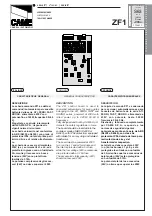
KEYSTONE
FIGURE 580 AND 583 BALLCENTRIC VALVES
INSTALLATION AND REPAIR INSTRUCTIONS
Complete storage, installation, disassembly and assembly instructions for
Eccentric style, round ported plug valves:
• F580 - DN 80 to 100
• F583 - DN 150 to 300
OPERATION
Wrench actuated valves
Wrench actuated straightway ballcentric valves
close by 90° clockwise rotation. Indication
marks are provided on the actuating stem to
show the plug position at any time and stops
are provided to limit the plug travel.
Gear actuated valves
Gear actuated valves cannot creep or slam.
The worm gear actuators used are designed to
prevent creep or slam (when properly adjusted)
in extreme or in intermediate (throttle)
positions. The valves are closed by turning
the actuator/operator input shaft clockwise.
The valve opens by turning the operator input
shaft counterclockwise. Indication marks are
provided to show the plug position at any time.
SAFETY PRECAUTIONS
The valve is a pressure vessel.
The valve must be depressurized prior to
performing maintenance.
When the service is of a clogging type, likely
to build up in the valve body space, it is best to
arrange for the pressure to be shut-off from
the seat end of the valve. In cases of extreme
clogging, and when the pipeline is horizontal,
the valve should be positioned so the valve stem
is horizontal and the plug rises into the top of the
body on opening. In vertical pipe runs, the valve
should be installed with the seat end flange up.
Valves to be buried should be opened and closed
under pressure at least once before installation.
This is required to verify that no parts have
become loose or damaged during shipment.
After the valves have been installed in line and
before use, gear actuator lubrication should
be checked (see the appropriate operator
maintenance manual).
STORAGE PROCEDURES
The valves should be stored on a pallet or 'skid'
in a clean, dry warehouse. If outdoor storage is
necessary the unit should be wrapped in plastic
(not supplied by Emerson) and be kept off the
ground and high enough to avoid standing
water or exposure to extreme conditions.
The valves should be stored with the disc/plug
fully open and ensure all flange protectors are
kept in place.
INSTALLATION
Straightway ballcentric valves are asymmetrical
in design. On all valves, one end flange is
marked 'seat' and this marking should be used
to identify the valve ends.
Some valves also have an arrow case on the
body. This arrow points towards the seat end,
and does not always indicate the preferred fluid
flow direction.
In general, straightway ballcentric valves will
seal against higher differential pressures when
the pressure is applied from the end opposite
to the seat end. If sealing against pressure
applied from the seat end is critical, then this
must be specified when ordering and the valves
then tested for this condition.
With normal gas and liquid service, the shut-off
direction and flow direction will commonly be
the same and the valve should then be installed
with the seat end downstream. In some
applications, such as pump output shut-off
valve, the purpose of the valve is to stop reverse
flow when normal flow ceases; in this case the
valve should be installed with the normal flow
from the seat end so that the pressure against
which the valve is to shut-off is applied from the
end opposite the seat. In cases where shut-off
is required in both directions, the valve should
be installed so that the highest differential
pressure at shut-off, or that against which the
sealing is most critical, is applied to the end
opposite the seat.
MAINTENANCE
The stem seals on the ballcentric valves are
long life items and will not, under normal
circumstances require replacement during the
life of the valve. When the service is such that
VCIOM-02966-EN 17/01
the need for replacement is expected, this can
usually be scheduled at plant shut downs or
done with pressure removed from the line in
which the valve is installed.
Emerson.com/FinalControl
© 2017 Emerson. All rights reserved.
Summary of Contents for KEYSTONE F580
Page 4: ......






















